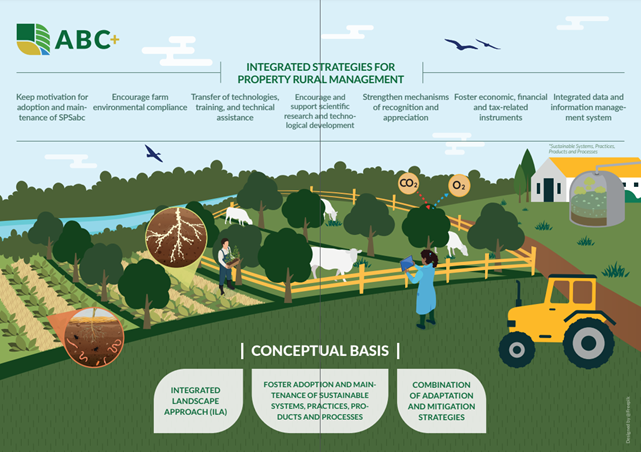Ministry of Agriculture, Livestock and Food Supply (MAPA), Brazi | Source | Download |
The ABC+ Plan, building on the successes of the first cycle (2010-2020), the new phase promotes science-based practices, technological innovation, and GHG mitigation through the Integrated Landscape Approach. Strengthened governance, robust monitoring, and Measurement, Reporting, and Verification (MRV) systems ensure transparency, continuous improvement, and the adoption of sustainable solutions. Economic incentives and market instruments will further support sustainable production, enhancing Brazil’s domestic and global image. By prioritizing regional actions and expanding the use of sustainable technologies, the ABC+ is a key national plan that addresses climate adaptation, food security, and sustainable development, positioning Brazil as a leader in resilient and low-carbon agriculture by 2030. The ABC+ Plan is supported by the following conceptual basis and integrated strategies.
Conceptual Basis:
- Integrated Landscape Approach (ILA) promotes sustainable land management by balancing agricultural productivity, conserving natural resources, valuing ecosystem services, and resolving land use conflicts while recognizing regional cultures and ensuring efficient, compliant land use.
- Synergy of adaptation and mitigation strategies, including conservation practices, integrated systems, biodiversity recovery, and risk management tools, are essential to reduce farming systems' vulnerability, enhance resilience, and ensure sustainable, efficient, and profitable agricultural production amidst climate change threats.
- Foster adoption and maintenance of Sustainable Systems, Practices, Products and Production Processes (SPSABC) through conservation farming practices to enhance agricultural efficiency, resilience, and sustainability by preserving natural resources through minimal soil disturbance, maintaining crop residues, and diversifying species, ensuring profitability while protecting ecosystems.
Strategies
- Sustain motivation for adoption and maintenance of SPSABC, fostering increased productivity and income, resilience and control of GHG emissions
- Technology transfer, training, and technical assistance
- Encourage and support scientific research and technological development and improvement of SPSABC
- Strengthen mechanisms for recognition and appreciation of adoption of SPSABC
- Promote economic, financial and fiscal instruments to support SPSABC
- Integrated data and information management system for effective Measurement, Reporting and Verification (MRV) Mechanisms
- Encourage farm environmental compliance and sustainable production through the Integrated Landscape Approach






